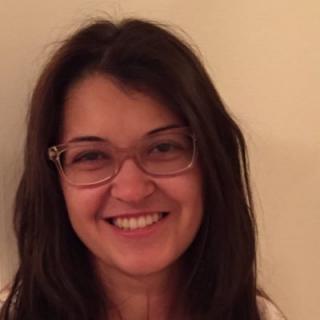Track: Modern CS in the Real World
Modern systems in production rely on decades of computer science research. Over time, new architectural patterns emerge that enable more resilient and robust systems. In this talk, we'll discuss some of these patterns from systems I've worked on at Google and the related work that provide insights into the motivations behind them.
Aysylu Greenberg works at Google on Drive infrastructure. In her spare time, she ponders the design of systems that deal with inaccuracies, enthusiastically reads CS research papers, and paints.
by Kavya Joshi
Software Engineer @Samsara
Your favorite distributed system and the concurrent program you wrote last week are built on the same foundational principle for ordering events across the system. This talk will explore the beautifully simple happens-before principle that lies behind these complex systems. We will delve into how happens-before is tracked in a distributed database like Riak, and how it’s implicitly maintained by the concurrency primitives provided in languages like Go. We will touch upon other sophisticated...
by Stuart Sierra
Clojure Developer/Contributor @Cognitect
What do Lisp, Prolog, Tcl, machine code, and XSLT have in common? It's a computer science-y word that sounds cool and lends an academic sheen to your programming language, but do you know what "homoiconicity" really means? Maybe you saw some Scheme in college, but S-expressions aren't just about macros. This talk will demonstrate the power that comes from having the same data representation at all layers: programming language, specification, database, inter-process communication, and user...
by Matt Adereth
Managing Director @TwoSigma
We often want to find the best settings for our systems, whether it’s configuring the best JVM parameters, optimizing user workflows, or selecting the right configuration for a machine learning algorithm. Black-box optimization techniques that can find good (hopefully optimal!) parameters have been investigated for the last 60 years, but over the last 20 years there’s been significant attention placed on creating versions that can take advantage of parallel compute.
In this talk, we’...
by Alex Kesling
VR Engineer @Google
Virtual reality has been all the rage of late. With a myriad new devices and everyone talking about it, it’s easy to get lost in the hype cycle… but how much has VR made it into the real world? Having reached more than a million students, Google Expeditions is at the forefront of bringing VR to the classroom. Though education presents a world of possibilities, it also brings a plethora of challenges. This talk will explore Google Expeditions as a case study in building meaningful VR...
by Deborah Hanus
PhD candidate at Harvard University
With recent advances in computational power, machine learning is positioned to change the way we interact with the world around us. Likewise, a surge of well-maintained machine learning libraries has made it possible for engineers to use machine learning models with minimal background. However, many find that using machine learning responsibly in your company can be harder than it seems. Here, we will discuss some of the challenges that can arise when working with data.
Tracks
Monday, 26 June
-
Microservices: Patterns & Practices
Practical experiences and lessons with Microservices.
-
Java - Propelling the Ecosystem Forward
Lessons from Java 8, prepping for Java 9, and looking ahead at Java 10. Innovators in Java.
-
High Velocity Dev Teams
Working Smarter as a team. Improving value delivery of engineers. Lean and Agile principles.
-
Modern Browser-Based Apps
Reactive, cross platform, progressive - webapp tech today.
-
Innovations in Fintech
Technology, tools and techniques supporting modern financial services.
Tuesday, 27 June
-
Architectures You've Always Wondered About
Case studies from the most relevant names in software.
-
Developer Experience: Level up Your Engineering Effectiveness
Trends, tools and projects that we're using to maximally empower your developers.
-
Chaos & Resilience
Failures, edge cases and how we're embracing them.
-
Stream Processing at Large
Rapidly moving data at scale.
-
Building Security Infrastructure
How our industry is being attacked and what you can do about it.
Wednesday, 28 June
-
Next Gen APIs: Designs, Protocols, and Evolution
Practical deep-dives into public and internal API design, tooling and techniques for evolving them, and binary and graph-based protocols.
-
Immutable Infrastructures: Orchestration, Serverless, and More
What's next in infrastructure. How cloud function like lambda are making their way into production.
-
Machine Learning 2.0
Machine Learning 2.0, Deep Learning & Deep Learning Datasets.
-
Modern CS in the Real World
Applied, practical, & real-world dive into industry adoption of modern CS.
-
Optimizing Yourself
Maximizing your impact as an engineer, as a leader, and as a person.
-
Ask Me Anything (AMA)



